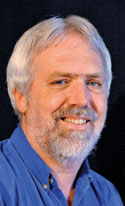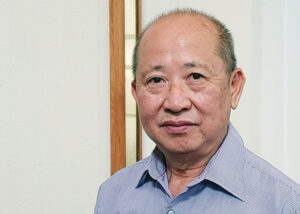Which is better for the church, a pastor with seminary training or a layperson groomed for the role and invited from the local context? While a seminary-trained pastor may be regarded as more professional, in some settings there are advantages to other models of leadership.
“The seminary pastor is trained to lead a congregation within the context of our culture,” explains Harold Peters-Fransen, lead pastor at North Kildonan Mennonite Church in Winnipeg.
Rebecca Slough, Dean of Anabaptist Mennonite Biblical Seminary (AMBS), agrees.
“A good theological education helps us see trends that are happening in the local congregation,” she said, adding, “It helps pastors to minister to people who are in deep places of need.”
Nearly 500 years ago, emerging Anabaptist congregations looked to Scripture for guidelines in choosing pastors. Arnold Snyder, history professor from Conrad Grebel University College in Waterloo, says that the Anabaptists did not have a single system for choosing leaders, but the earliest confession indicates that they began their journey with simple adherence to Scripture.
“We have been united as follows concerning shepherds in the church of God. The shepherd in the church shall be a person according to the rule of Paul, [1 Tim. 3:7] fully and completely, who has a good report of those who are outside the faith,” says the Schleitheim Confession of 1527. Article V goes on to say, “But if the shepherd should be driven away or led to the Lord by the cross, at the same hour another shall be ordained [or “installed”] to his place, so that the little folk and the little flock of God may not be destroyed, but be preserved by warning and be consoled.”
For the next few hundred years, most Mennonite congregations chose pastors from within the congregation. Training was limited and often came after installation. Pastors were given a great deal of respect, but generally they were unpaid.
Mennonite biblical training was available by the early 20th century, but it wasn’t until after the 1950s that congregations expected professional training. By the 1970s most MC Canada churches were hiring seminary graduates and paying them salaries that reflected their training.
That shift in expectation put small rural churches in a difficult situation. They cannot afford the cost of supporting a seminary-trained pastor and sometimes they have trouble attracting and keeping graduates in isolated locations.
“We’re only 40 people; it’s hard to support a seminary-trained pastor,” says Frank Elias, a deacon at Graysville Mennonite Church in Manitoba.
Ethnic churches also often look at part-time or unpaid ministers. For Laotian Mennonites with a background in Buddhism, it means treating the pastor similarly to a Buddhist priest who is dependent on offerings of food and money from the believers.
“Lao Mennonite churches are first generation believers. For them to hire or have a paid pastor is highly unlikely due to economic reasons,” says Chinda Kommala, pastor of the Lao Canadian Evangelical Mennonite Church in Toronto.
Lay pastor models
The lay model comes in different shapes and sizes. One church might hire someone well-known to them but with little or no Bible training. For example, Bruce Jantzen from Laird, Sask., worked in a pulp-and-paper mill in Prince Albert for 20 years before being asked to serve. His father had been a pastor and was hoping Jantzen would choose the same path. Jantzen had a few semesters of Bible school under his belt but no degree. He served his father’s church for 18 months before being asked to lead the congregation at Laird.
“For me it’s been a wonderful experience. I didn’t know I had a call,” Jantzen said of his pastorate at the Laird Mennonite Church.
Another congregation might choose someone who has a degree from an established Bible college but has not gone the seminary route and chooses to work in the community and serve the church on the weekends.
Rob Wiebe lives in Burns Lake, B.C. He originally received a degree from Canadian Mennonite Bible College (now Canadian Mennonite University) planning to enter the ministry. After an unpleasant experience, he decided to take a break. Having worked as a bread salesman and then for 20 years in a sawmill, Wiebe had logged in life experience before he was approached about serving in a remote community an hour away in Granisle. Every Saturday morning, he and his family make the trip north and spend the weekend serving the church.
“In looking at my ministry, I feel the need to get more tools,” he said listing the particular needs of a retirement community church.
Others may have no Bible training and are asked to serve in a paid position. Russ Friesen pastors the Tiefengrund Mennonite Church in Sask. He grew up in the church and has been trucking or farming for most of his adult life.
Les Regier, church chair at Tiefengrund, explains the benefits of hiring from within the congregation.
“We feel comfortable with Russ, we know him,” he explained. Regier believes the lay model can work for larger churches too. But perhaps the lay model works for small groups because it’s also easier on the church budget. It seems as though each congregation works out their own interpretations of the lay model.
Trained versus lay ministry
A sampling of minds from across the country exposes various opinions on the lay pastor model versus the trained pastor.
“The lay model was [in the past] helped along by strong preaching. The pastor was educated in the pew and at home,” said Herb Sawatzky, pastor of Avon Mennonite in Stratford, Ont. But, he cautions, it wasn’t always a rosy picture. His grandmother saw the resulting heartache when a church over-used a pastor. She felt strongly that it was not a good system, said Sawatzky.
Frank Elias, a man in his seventies, has watched the changes in the Mennonite church firsthand. He joined Graysville Mennonite in 1957 when the congregation still depended on unsalaried ministers. In 1974 the change to paid leadership was made.
“The reason the model failed, even if you have the abilities, is that it was too much for one person,” said Elias.
The pastor’s salary plays a role in the pastor-congregation relationship. In the old days, an unpaid pastor was chosen for life and respected as a major decision-maker. When a pastor is paid, and seen as employed by the congregation, it may influence how he preaches.
“My father was a lay minister and he did remark to me on more than one occasion that he had more freedom to preach than I, as a paid pastor, did,” said Harold Peters-Fransen.
Sawatzky isn’t so sure. “It depends on how big a part of the community [you] are. You’re preaching to people you live with, do business with. . .that would muzzle the tongue. If you’re afraid of conflict, then various inhibitions come into play.”
Choosing a pastor from within the congregation can be complicated if the church assumes that decisions are made by the congregation. If there is conflict between the pastor and congregation, asking the pastor to leave is not really an option.
The importance of training
Mennonite pastors of ethnic congregations believe that a pastor needs a call from God, but training is also important.
“To me, early Anabaptists had the right belief by choosing their leader from within,” said Kommala. “Some individuals may only want to study just to have a better job, but not being called by God and they end up destroying others spiritually,” he said.
Joseph Liou, pastor of the Calgary Chinese Mennonite Church says that, for a pastor, a call from God is very important.
“It’s a post-modern world. I would prefer a church calls from within but [the individual] still needs to be trained. Training is important; not for personal gain but to help the church,” he said.
Most full-time pastors today would agree that the paid model is easier on the pastor’s family because the pastor is not working two jobs. In addition, a seminary-trained pastor learns administration and counselling skills and cultivates a connection to the seminary because there’s already a relationship established there.
“Seminary education has its strengths,” admits Vic Winters, a ministry coordinator in the Leamington Mennonite Church. The pastor can then devote all his energies to the church. There are no problems with divided loyalties between his or her job and the church.
Slough concedes that a person without theological training can pastor a church but stresses the importance of being supported by other pastors.
“It’s possible to lead a congregation effectively if [the pastor] can be willing to meet with his or her own peers,” she said, especially other pastors who are willing to grow in their own walk with God.
“For the most part, congregations are thankful that their leadership can dedicate their working life to the work of the church, so find it a healthier model,” said Peters-Fransen
Models for the future
In the Leamington Mennonite church, a large urban congregation of 400-500 people, paid pastors first began to appear on the scene in the eighties. Winters is a retired educator who brought the occasional message to the congregation. When the church was replacing the lead pastor, he was asked to serve but has no background in theology. As a ministry coordinator, he believes strongly that pastors are not hired simply to do all the work.
“I believe in a busy, muscular church. Churches should work hard; it’s not a spectator sport. Leadership is modelling for others,” said Winters.
Over the past number of years, Mennonite colleges and universities in Canada have worked at providing enhanced theological training so that students can do more studying locally without moving to Indiana for years of seminary.
In response to the request for more options in seminary training, the Anabaptist Mennonite Biblical Seminary in Indiana is working at offering more distance education choices. There is not one model for all congregations, but hopefully churches that cannot afford a pastor with a regular seminary degree can help their leaders find ways to develop their skills and deepen their biblical knowledge.
According to Rebecca Slough, Dean of the seminary, AMBS is looking at the idea of hybrid degrees in which the person wanting to study theology will be able to take part of their degree online and only need to spend one or two weeks of intensive study on the seminary campus.
There are benefits to being able to study online and stay in one’s own community. Families can avoid the painful task up uprooting their children during their formative years; heavy debt loads can be avoided since the spouse of the student can live and work in their own community to support the student and the student can apply what they are learning online directly to their ministry situation. But there needs to be a balance, she said, citing some very important aspects of a seminary experience.
Some students, for example, have been badly hurt from ministry and seminary is a place where they can come and heal.
“Ministry is a hard place to be,” she pointed out. Since many pastors can’t find places of support where they can share their challenges, seminary becomes for them, a community of like-minded people who can identify with ministry issues and offer encouragement to each other.
Another plus, is that leaving home to study allows a person to make a complete break from their home environment.
“Sometimes when we stay in one place, we lose the skill to see things more broadly.”
Added to that, she believes that children can gain from being in a new situation. But ultimately, the parents must decide if their child can handle being in a racially-integrated learning environment.
And there are drawbacks to studying in an online environment. A person needs to be disciplined and have the time to devote to the course. It can be hard to keep motivated; not having a classroom environment to be accountable to. The temptation to hide behind a computer screen or fall behind in one’s studies is a real danger. And in the final analysis, there are no savings, she said, either for the school or for the student.
Slough herself has been tasked with writing a proposal to move the idea from paper to policy. The seminary hopes to have everything in place by fall of 2013.









Leave a Reply
You must be logged in to post a comment.